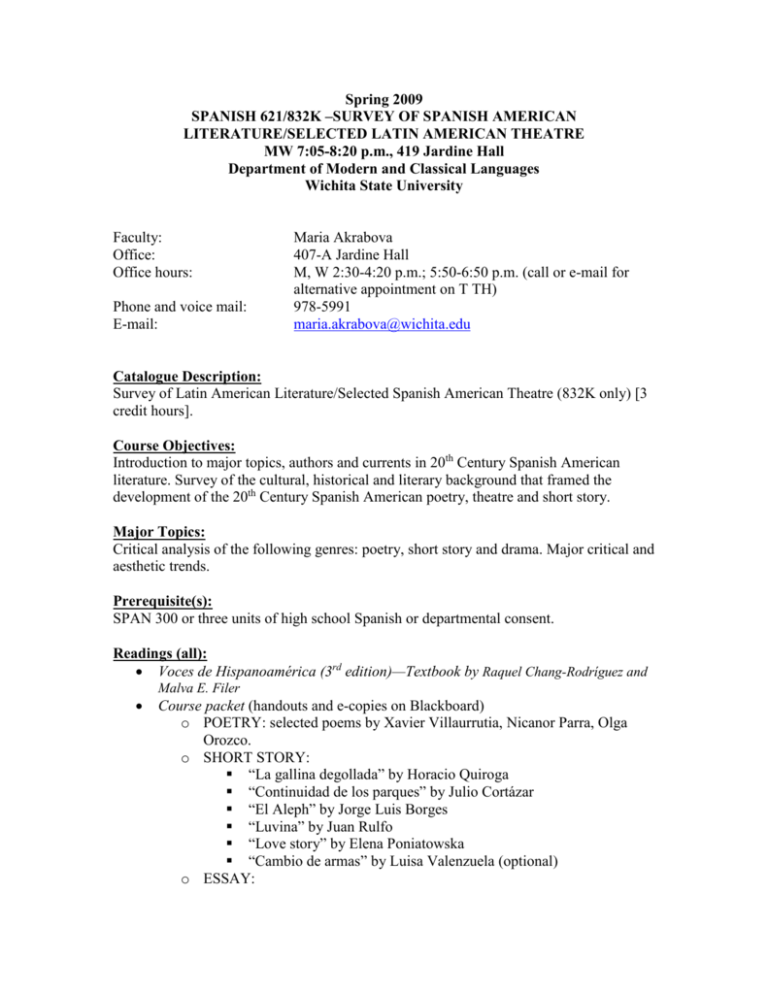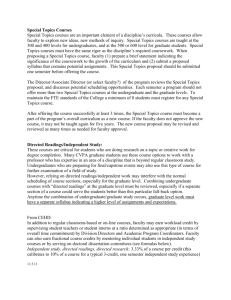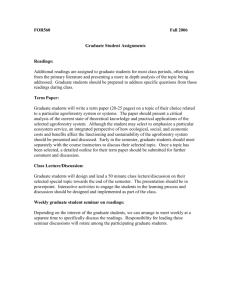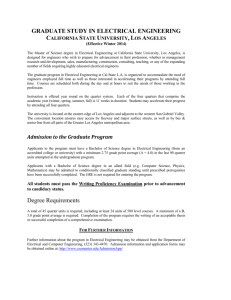Faculty: Maria Akrabova - Wichita State University
advertisement

Spring 2009 SPANISH 621/832K –SURVEY OF SPANISH AMERICAN LITERATURE/SELECTED LATIN AMERICAN THEATRE MW 7:05-8:20 p.m., 419 Jardine Hall Department of Modern and Classical Languages Wichita State University Faculty: Office: Office hours: Phone and voice mail: E-mail: Maria Akrabova 407-A Jardine Hall M, W 2:30-4:20 p.m.; 5:50-6:50 p.m. (call or e-mail for alternative appointment on T TH) 978-5991 maria.akrabova@wichita.edu Catalogue Description: Survey of Latin American Literature/Selected Spanish American Theatre (832K only) [3 credit hours]. Course Objectives: Introduction to major topics, authors and currents in 20th Century Spanish American literature. Survey of the cultural, historical and literary background that framed the development of the 20th Century Spanish American poetry, theatre and short story. Major Topics: Critical analysis of the following genres: poetry, short story and drama. Major critical and aesthetic trends. Prerequisite(s): SPAN 300 or three units of high school Spanish or departmental consent. Readings (all): Voces de Hispanoamérica (3rd edition)—Textbook by Raquel Chang-Rodríguez and Malva E. Filer Course packet (handouts and e-copies on Blackboard) o POETRY: selected poems by Xavier Villaurrutia, Nicanor Parra, Olga Orozco. o SHORT STORY: “La gallina degollada” by Horacio Quiroga “Continuidad de los parques” by Julio Cortázar “El Aleph” by Jorge Luis Borges “Luvina” by Juan Rulfo “Love story” by Elena Poniatowska “Cambio de armas” by Luisa Valenzuela (optional) o ESSAY: “Sepa por qué es usted machista” by María Elena Walsh (optional) Graduate Readings (SPAN 832K only) 1. Florencio Sánchez, Barranca Abajo 2. Rodolfo Usigli, El gesticulador (o Corona de sombra) 3. Emilio Carballido, Yo también hablo de la rosa (o El censo) 4. Griselda Gambaro, Antígona furiosa 5. Sabina Berman, Entre Villa y una mujer desnuda Films: Eréndira (based on the story by García Márquez) (selected scenes: magical realism) Neruda’s postman/ Il Postino (based on Ardiente paciencia by Antonio Skármeta) – selected scenes Evaluation Criteria: SPAN 621 Class participation 10% Journal and prepared questions for class discussion 10% Short quizzes 5% Research and Presentation: Poetry 10% Research and Presentation: Narrative 10% Test 1: 10% Test 2: 10% Test 3: 10% Test 4 (Take-home) 15% Literary Analysis 10% SPAN 832 Class participation & graduate discussions Annotated Bibliography Presentation on theatre Test 1: Test 2:` Test 3: Test 4 (Take-home) Final Paper 15% 10% 10% 10 % 10 % 10 % 20 % 15% Grade components: A. SPAN 621 Class participation. Coming to class prepared and participating in the discussions is essential for the successful completion of this course. Make sure you have done all the readings before coming to class. Journal. For each class session you should bring a journal entry related to the readings to be discussed. For poetry: write a 2-4 line description/opinion of all poems scheduled to be discussed this day. For short story: write a short (1 paragraph) summary of the plot. For drama: select 3 characters from the play to be discussed the same day and give a 2-5 sentence description/characterization. Essay: write a one-paragraph reaction to the essay to be discussed. Journals will be collected four times during the semester. Typed entries are preferred. Quizzes. You can expect short pop-quizzes related to each genre/reading. Research and Presentation. For both poetry and narrative (short story or essay), you should find, read, and present to the class a work (one poem, one short story/essay) not included in the reading list. In order to avoid overlapping, DO NOT use the textbook as a source, but instead utilize the library resources. Remember: your authors should be from Latin America, and the texts should not pre-date 1900. Tests. Three tests will be administered during the course of the semester. They will include questions on genre definition, cultural background, and on discussed readings. A fourth test will be given as a take-home assignment, and should be turned in the last day of classes. Literary Analysis. A 5-7 page essay on a work in one of the discussed genres. B. SPAN 823K Class participation and graduate discussion. Active class participation is expected and encouraged. A schedule of graduate discussions and related readings will be distributed additionally. When discussing a specific literary work, one or more students will be in charge to present a general overview of the text(s) and the scholarly article they have read on said text(s). Work Florencio Sánchez, Barranca Abajo Rodolfo Usigli, El gesticulador (o Corona de sombra) Emilio Carballido, Yo también hablo de la rosa (o El censo) Griselda Gambaro, Antígona furiosa or Sabina Berman, Entre Villa y una mujer desnuda Student Student 1: Student 2: Student 1: Student 2: Student 1: Student 2: Student 1: Student 2: Presentation on Latin American Theatre. This is a group project. Based on our graduate discussions, you will present major figures and works of Latin American Theatre to the rest of the class. Annotated Bibliography. For all texts included in the graduate discussions (by Sánchez, Usigli, Carballido, Gambaro and Berman), students must read at least one scholarly article and create an annotated citation, using the MLA style. The final Annotated Bibliography will contain 1) your own entry for each article; 2) the entries for each article, supplied by your classmates during the graduate discussions. Tests. See description above. Final paper. A 10-12 page literary analysis of a selected text in any of the four genres. Texts not included in the course list may be used too. You may opt to do an analysis of an aspect of a theatrical text commented during the graduate discussions. PROGRAMA DEL CURSO / COURSE CALENDAR (Assignments are listed for the day they should be prepared for. All readings should be done before class. ALWAYS READ THE BIOGRAPHY NOTE ON EACH AUTHOR.) En clase (Texto) Week 1 W 1/21 Week 2 M 1/26 W 1/28 Week 3 M 2/2 W 2/4 Introducción al curso. La literatura como arte y fenómeno estético. Introducción a la poesía. “La realidad americana y la renovación literaria” (197-206) Lugones: “Delectación amorosa”, “Divagación lunar”, “A los gauchos”, “Salmo pluvial”, “El jilguero”. Darío: “Era un aire suave...”, “Sonatina”, “El cisne”, “Yo soy aquel...”, “A Roosevelt”, “Lo fatal”, “Los cisnes”, “Canción de otoño en primavera”, “El velo de la reina Mab”, “Lillo”, “El Chiflón del Diablo”. Darío (cont.) Week 4 M 2/9 Graduate students meet this week. /Journals due on Wednesday Nájera: “Para entonces”, “La duquesa Job”, “De blanco”, “La mañana de San Juan”. Silva: “Nocturno”, “Vejeces”, “Paisaje tropical”. W Nájera/Silva (cont.) 2/11 Week 5 M 2/16 W 2/18 Martí: “Mi caballero”, “Sobre mi hombro”, “Versos sencillos”, “Copa con alas”, “Poética”, “Dos patrias”, “Domingo triste”. Martí (cont.) “Continuidsad y ruptura: hacia una nueva expresión” (p. 279-292) Week 6 M 2/23 W 2/25 Week 7 M 3/2 W 3/4 Examen 1 Mistral: “Los sonetos de la muerte”, “Sueño grande”, “Pan”, “La desvelada”. Storni: “Tú me quieres blanca”, “Cuadrados y ángulos”, “Peso ancestral”, “Hombre pequeñito”, “El hijo”. Vallejo: “Los heraldos negros XXVIII”, “Voy a hablar de la esperanza”, “Piedra negra sobre una piedra blanca”, “Masa”. Week 8 M 3/9 Graduate students meet this week./Journals due on Wednesday Huidobro: “Nipona”, “Arte poética”, “Luna o reloj”, “Altazor o El viaje en paracaídas”. W Neruda: “Poema 20”, “Walking around”, “Alturas de Macchu Picchu”, “Oda a los calcetines”, “Estación inmóvil”. 3/11 Week 9 M 3/16 W 3/18 SPRING BREAK, no classes. SPRING BREAK, no classes. Week 10 M 3/23 W 3/25 Quiroga: “La gallina degollada”. Mariátegui: “Siete ensayos de interpretación de la realidad peruana”. Week 11 M 3/30 W 4/1 Week 12 M 4/6 W 4/8 Graduate students meet this week./ Journals due on Wednesday Presentaciones: poesía (SPAN 621) Examen 2 Tarea: leer “Consolidación y expansión”(p. 409-417) Borges: “Borges y yo”, “El Aleph”. Rulfo: “Nos han dado la tierra”, “Luvina”. Week 13 M 4/13 Cortázar: “La isla a mediodía”, “Continuidad de los parques”. W 4/15 Fuentes. “Chac Mool”; García Márquez: “La prodigiosa tarde de Baltazar” Week 14 M 4/20 Allende: “Clarisa”, “La mujer del juez”. W Valenzuela: “Los censores”, “Cambio de armas”. Tarea: leer “Asimilación y diferencia (p. 503-511) 4/22 Week 15 M 4/27 Graduate students meet this week./ Journals due on Wednesday Poniatowska: “Las lavanderas”, “Esperanza número equivocado”, “Love story” (optional). W` Examen 3 4/29 Week 16 M 5/4 W 5/6 Week 17 M 5/11 Presentaciones: narrativa (SPAN 621). Repaso. Presentación sobre teatro latinoamericano (SPAN 832K) SPAN 621: turn in Literary Analysis SPAN 832E: turn in Final Paper Last day of classes. Turn in: Take-home Exam







